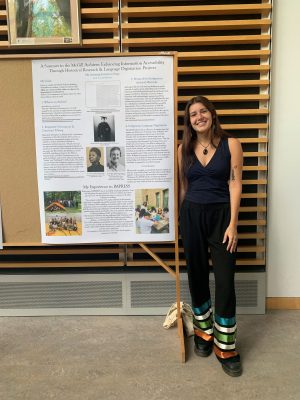The Indigenous Mentorship and Paid Research Experience for Summer Students (IMPRESS) offers Indigenous undergraduate students from McGill or other Quebec post-secondary institutions, a unique experiential learning opportunity to conduct research with a McGill professor, or to work on a project at one of our units — all while being paid! Three IMPRESS students spent their summer at McGill Libraries, specifically in the Collections, Rare Books & Special Collections and Teaching & Learning units.
By Leah Louttit-Bunker, a fourth year student majoring in History with a double minor in Indigenous Studies and Anthropology, and an IMPRESS intern at McGill University Libraries. Learn more about Leah’s internship.
McGill University was established in 1821 and officially opened its doors in 1829 – but only to men. Women were not yet admitted to the university until 1884, sixty-three years after its establishment. Here are some women that have attended McGill in the 19th and 20th centuries who have contributed to the advancement of women at this institution, and whose fonds are held at McGill.
Born in 1868 in St. Andrews East, Maude Elizabeth Seymour Abbott was among the first women to graduate with a Bachelor of Arts from McGill but was denied admission to the McGill Medical School since women were not yet admitted. She then went on to attend the University of Bishop’s College and received her medical degree in 1894. Following postgraduate studies in Europe, Abbott returned to Montreal where she met the Chair of Pathology at McGill, Dr. George Adami, who appointed her Assistant Curator of the Medical Museum in 1898. In addition to her efforts at curating and maintaining the specimen collection at the Medical Museum, Abbott became a renowned teacher and an expert in cardiac disease. In 1924, the Medical Museum and the Pathology Department were moved from Strathcona Building, and Abbott was named curator of the new Central Medical Museum until her retirement in 1936. She was a founding member of the Federation of Medical Women of Canada (FMWC) and the International Association of Medical Museums. She was the first woman to be honoured by the Pathological Society of London. She was awarded the Lord Stanley Gold Medal (1890), the Senior Anatomy Prize from Bishop’s College (1894), the Chancellor’s Price from Bishop’s College (1894), the Person of National Historic Significance from Parks Canada (1993), and an induction into the Canadian Medical Hall of Fame (1994). (See more information on Maude Elizabeth Abbott here: https://archivalcollections.library.mcgill.ca/index.php/abbott-maude-e-maude-elizabeth-1869-1940)
Dr. Barbara Althea Jones was born in the late 1930s in Barataria, Trinidad, and described herself as “a geneticist by vocation, a poet by avocation.” She graduated with a Bachelor of Science in agricultural botany from Imperial College of the University of the West Indies, the first woman to graduate from that institution. She went to Cornell University on a Trinidad Government Scholarship, receiving her M.A. (1962) and Ph.D. (1965) in plant breeding and genetics, becoming the first woman in the West Indies to earn a doctorate. Dr. Jones came to Canada in 1966 to do postdoctoral research at Macdonald College. From 1966 to 1968, she taught genetics and biology at Marianopolis College, Sir George Williams University, and McGill University. In 1968, Dr. Jones was appointed Assistant Professor of Genetics at McGill. At the time of her death, she had published two volumes of poetry, one of these volumes is titled Among the Potatoes, a wide-ranging collection that touches on many topics, including her life as a student, love, home, mental health, and race. She also published in literary journals and gave frequent talks and readings, in person and on radio and television. Her poetry and other writings revolved around the theme of Black experiences; she wrote in the McGill Reporter in 1968 that her goals were oriented “towards a new Black man, towards the full realization of man’s consciousness and potential, and towards a new humanism.” In an archived letter, she also asked colleagues to donate scientific books “for universities of developing countries where for some reason it is difficult to obtain texts.” (See more information on Dr. Barbara Althea Jones here: https://archivalcollections.library.mcgill.ca/index.php/jones-barbara-althea)

Dr. Margaret Gillett, photo taken by Doris Giller (16 April 1968). “Novel about 19th Century Poet of Particular Relevance Today”. Montreal Star. Montreal, Quebec. p. 26.
Dr. Margaret Gillett was born in 1930 in Wingham, Australia, and was hired as an associate professor of education at McGill in 1964, after receiving a Ph.D. in education at Columbia University in 1962. She became a full professor in 1967 and worked at McGill until her retirement in 1994. Dr. Gillett was a founding editor of the McGill Journal of Education, and she introduced Women’s Studies to the university. She wrote two major works on education titled A History of Education (1966) and Foundation Studies in Education (1973). Additionally, she wrote a novel on the life of the poet Francis Thompson in 1968, titled the Laurel and the Poppy. Dr. Gillett organized the McGill Committee for Teaching and Research on Women, served as a member of the Senate Committee on Women, and coordinated the Women’s Studies Minor. She also represented Canada on the United Nations Commission on the Status of Women. In 1981, she published We Walked Very Warily: A History of Women at McGill, and in 1986, she published Dear Grace, A Romance of History. In 1988, she became the first director of the McGill Centre for Research and Teaching on Women. Dr. Gillett was awarded with the Governor General’s Persons Award in 1996 and the Royal Society of Canada’s Award in Gender Studies in 2004. The Margaret Gillett Award for Research on Women has been granted by McGill University in her honour since 1994. (See more information on Dr. Margaret Gillett here: https://archivalcollections.library.mcgill.ca/index.php/gillett-margaret-1930)


















Leave a Reply
You must be logged in to post a comment.